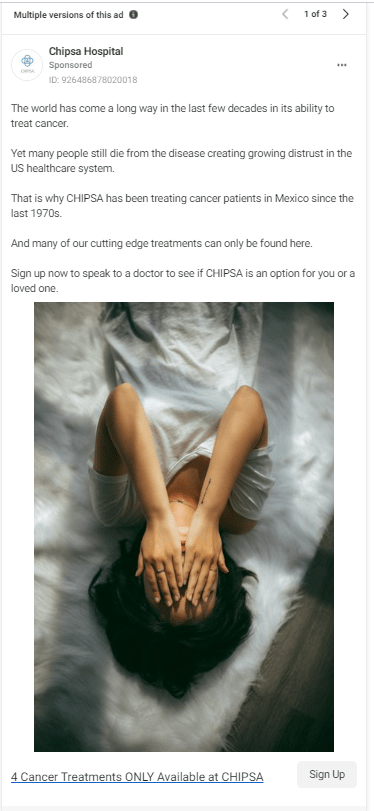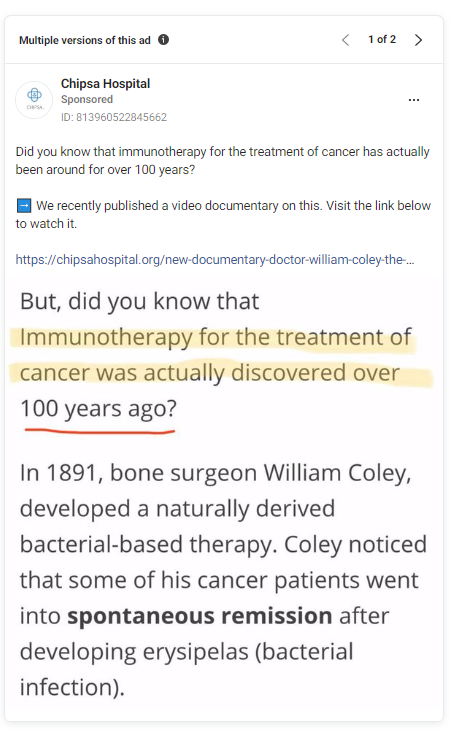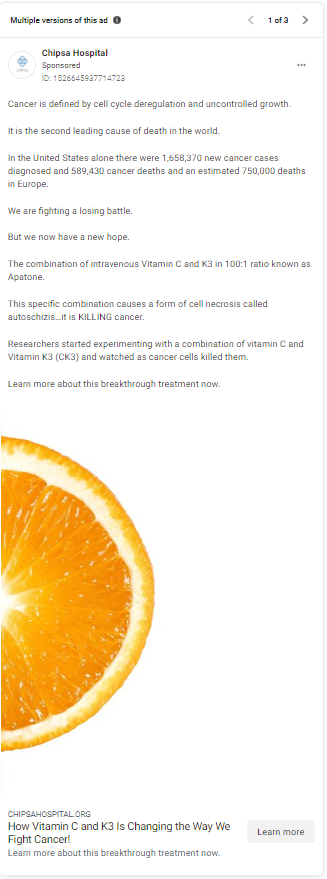Facebook and its parent company, Meta, don’t exactly have a great track record when it comes to combatting online disinformation.
At the start of the COVID-19 pandemic, Meta came out publicly against advertisements pedalling questionable health information and things like vaccine misinformation, yet they persist. Advertisements for unproven, debunked, and even harmful cancer treatments continue to appear on Facebook and Instagram, according to a report from MIT Technology Review. The ads still show up on Meta’s social networks in spite of the company policy prohibiting ads that contain misleading health information.
“Ads must not contain deceptive, false, or misleading claims like those relating to the effectiveness or characteristics of a product or service, including misleading health, employment or weight-loss claims that set unrealistic expectations for users,” said Meta’s policy. The company’s community standards also bar site content from “Promoting or advocating for harmful miracle cures for health issues.”
However, as Tech Review pointed out, Meta’s Ad Library shows that multiple advertisements ran in the U.S. from clinics hawking cancer treatments unapproved by any regulatory bodies like the Food and Drug Administration. And if you’re a user that Meta’s algorithms have determined to be interested in cancer treatment, you’re likely to find your feed chock-full of unverified statements about the disease and supposed cures.
A centre in Mexico called CHIPSA Hospital, for instance, has several ads in the Meta library referencing “cutting edge” or “breakthrough” treatments, offered exclusively at their facility. CHIPSA stands for Centro Hospitalario Internacional del Pacifico, S.A. Cancer experts told Tech Review that there’s clear reasons these supposed treatments aren’t widely available elsewhere.

CHIPSA’s treatments centre on “Gerson Therapy,” or a diet regime that involves drinking 13 glasses of juice daily and consuming a wide array of supplements. It was founded by Charlotte Gerson, the daughter of the man who came up with the “Gerson Immuno-Nutrition Protocol.” The unproven strategy has been fundamental to the facility since it was opened in 1979, according to the CHIPSA website. There is no scientific evidence that the Gerson method has any beneficial effect for cancer patients.
The treatment is “all nonsense,” David Gorski, a surgical oncologist at Wayne State University in Michigan, said to Tech Review.


Other CHIPSA ads on Facebook promote further unverified treatments offered at the facility, like high doses of vitamin C or “Coley’s toxins” — which can be an actively harmful, said University of Utah oncology researcher, Skyler Johnson, to Tech review.
From the report:
The danger is not simply that the treatments are unproven or ineffective. Some alternative cancer treatments advertised on the platform can cause physical harm. Coley’s toxins, a treatment developed in the late 19th century and offered at CHIPSA, comes with risks including infection, site reactions, anaphylaxis, and in severe cases shock, says Johnson.
In a 2017 study, Johnson and his co-researchers found that breast cancer patients who receive these “alternative medicine” treatments in lieu of standard, FDA-approved ones were more likely to die after five years when compared with those who received conventional treatments, like chemotherapy.
On top of the health risks, these alternative treatments are often expensive, costing tens of thousands of dollars, according to Tech Review. Insurance doesn’t cover the sort of services that CHIPSA provides, and the company’s FAQ page on costs leads to a dead link.
Meta did not immediately respond to Gizmodo’s request for comment, but told Tech Review that they recently removed a couple of select advertisements. However, very similar versions of those problematic ads, as well as others, remain.
From Tech Review:
MIT Technology Review alerted Meta to five CHIPSA ads, along with three ads from another international clinic called Verita Life. In response, Meta spokesperson Mark Ranneberger said that it had removed “several of the ads for violating our misleading claims policy, which prohibits claims of cures for incurable diseases.”
When asked for the specifics of the ads removed, Ranneberger said that two were rejected: the one claiming that Apatone was “killing” cancer and another that mentioned “growing distrust” of the US health-care system while advertising exclusive cancer treatments. Another ad using identical text to that second one but a different image remains active.
Site users are free to report ads that they believe violate Facebook and Meta’s policies. Yet even if a company is found in violation, Meta told Tech Review that ad suspensions are temporary.
Online advertisements are never a good place to look for reliable information. For vulnerable people, though, it’s easy to understand how a “cutting edge treatment” that pops up on your newsfeed could feel like hope. Unfortunately, in this case, hope can hurt.
